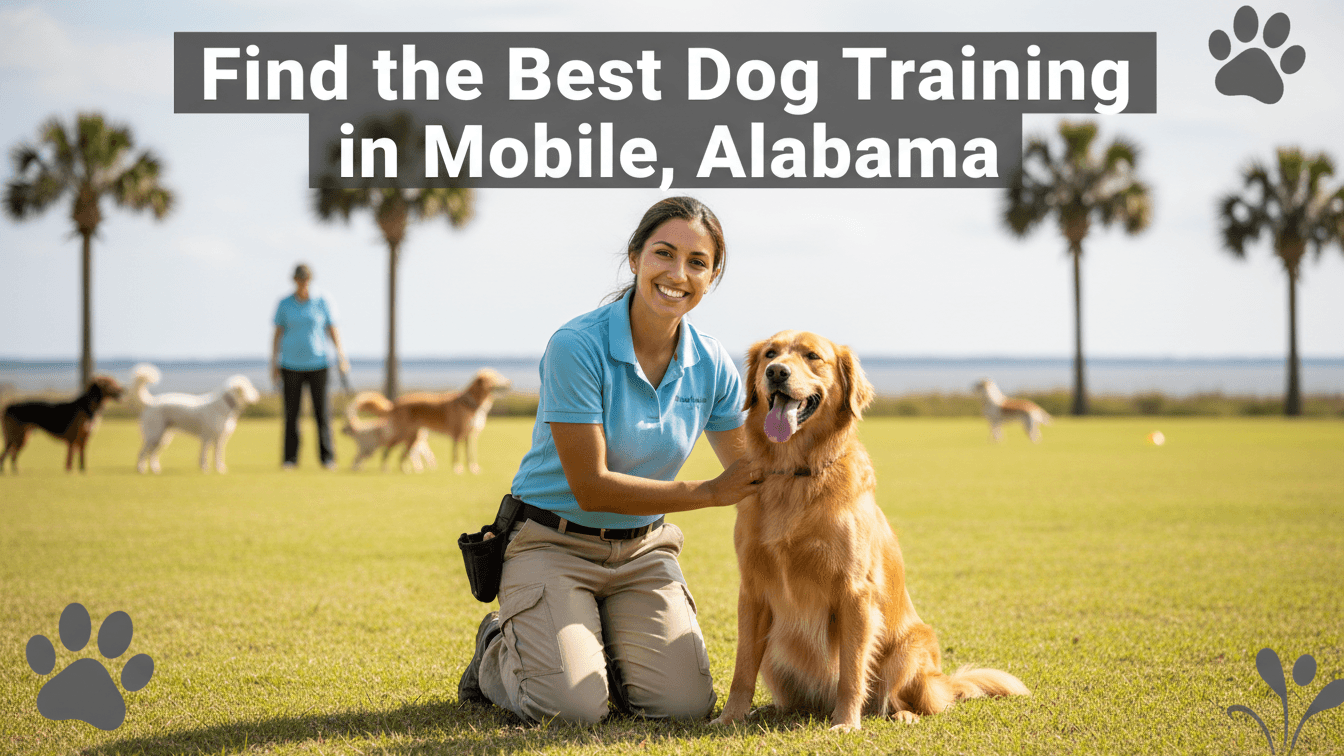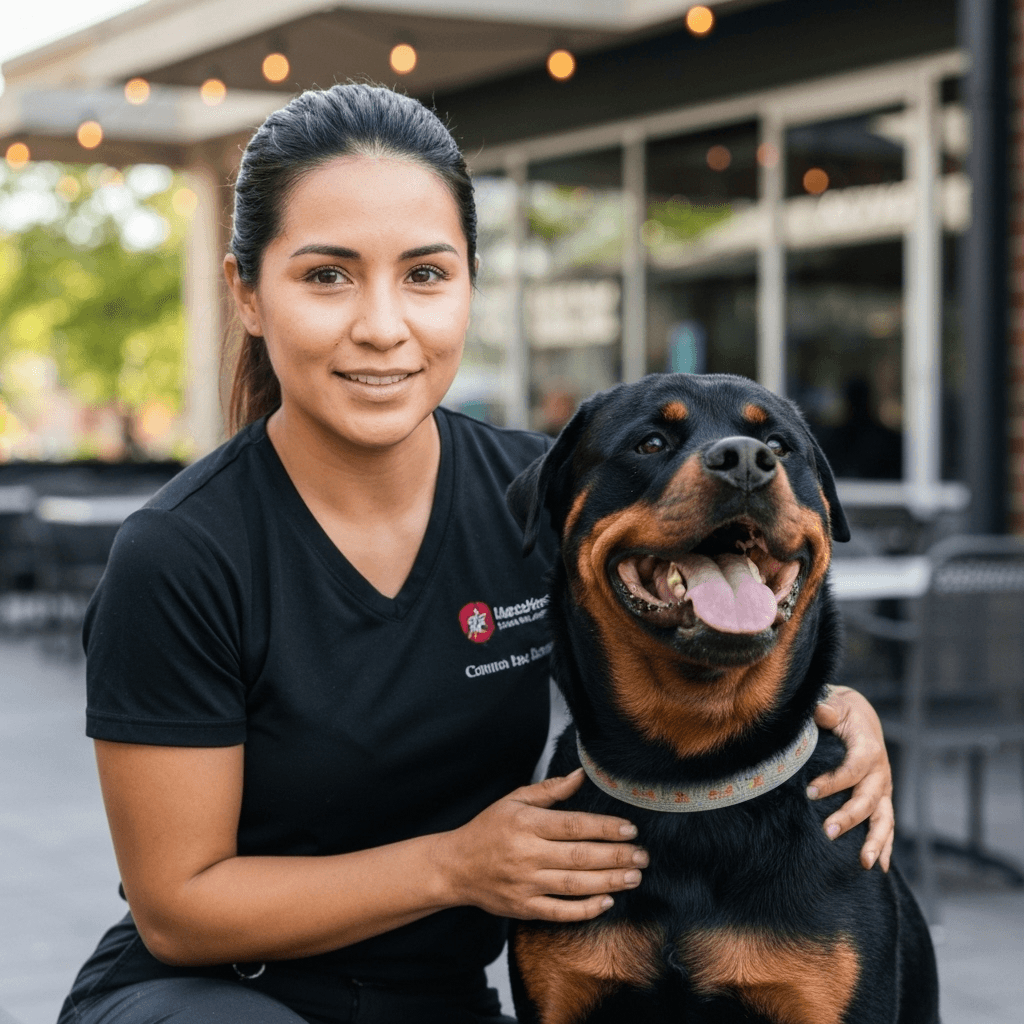Finding the Right Dog Trainer in Mobile
When you’re walking your dog through the historic streets of Midtown or trying to enjoy a coffee on a LoDa patio, good training makes all the difference. Your dog needs to navigate busy Dauphin Street sidewalks, stay calm during Mardi Gras festivities, and handle the constant stream of friendly neighbors who want to say hello from their front porches.
The best training gives your dog real skills they can use in these everyday Mobile situations. It should feel safe and positive for your pet while giving you clear steps to practice at home between sessions.

What Makes a Good Dog Trainer
A quality trainer uses positive reinforcement methods and understands that your dog needs to work well in actual Mobile environments. That means teaching calm behavior around the bustling farmers market, polite greetings at Bienville Square, and loose-leash walking past the historic homes in Spring Hill.
When you’re interviewing trainers, ask about their experience with your specific challenges. Maybe your puppy needs socialization before exploring downtown, or your rescue dog gets overwhelmed by the crowds at outdoor festivals. Some trainers pursue voluntary certifications, which can indicate their commitment to ongoing education. You can learn more about credentials like CPDT-KA, KPA-CTP, and others by reviewing dog trainer certifications.
Since Alabama doesn’t require special licensing for dog trainers, look for professionals who carry liability insurance and follow local park rules when working in public spaces.
Training Approaches That Work

The most effective methods rely on positive reinforcement rather than fear or intimidation. Here’s what you’ll typically find in the Mobile area:
Puppy training focuses on building confidence through short, fun sessions. Your young dog learns house manners, bite inhibition, and how to stay calm around strollers and bikes at local parks.
Basic obedience teaches the essential skills every Mobile dog needs: sit, down, stay, recall, and leash walking that actually works when you’re navigating weekend crowds or stopping to chat with neighbors.
Behavior modification uses careful, gradual approaches to help dogs who struggle with reactivity, fear, or aggression. Good trainers prioritize safety while using techniques like desensitization and counterconditioning.
In-home training addresses the specific challenges of your living situation. Whether it’s barking at delivery trucks from your apartment window or jumping on guests at your front door, working in your actual space speeds up results.
Day training and board-and-train programs let the trainer do intensive work with your dog, then teach you how to maintain the progress. These options work well for busy schedules, but you’ll still need to practice consistently at home.
What Training Costs in Mobile
Prices vary based on the trainer’s experience, session length, and type of program. Here’s what most dog owners in Mobile and Mobile County can expect to pay:
| Service Type | Typical Cost (Mobile Area) |
|---|---|
| Group classes (4–6 weeks) | $130 – $250 total |
| Private lessons (60–90 minutes) | $80 – $160 per session |
| Puppy package (4–6 lessons) | $280 – $550 total |
| Day training (trainer works dog + owner coaching) | $350 – $800 per week |
| Board and train (2–4 weeks) | $1,600 – $3,800 total |
| Behavior consult for reactivity/fear | $110 – $220 initial |
Complex behavior cases or trainers with advanced credentials typically cost more. Always ask what’s included in the price: number of sessions, travel fees, homework support, and follow-up help. Many trainers offer a free phone consultation to discuss whether they’re a good fit for your situation.
Questions to Ask Before You Hire
When you’re talking to potential trainers, these questions will help you find someone who matches your needs:
- What training methods do you use, and how do you keep sessions positive for my dog?
- What experience do you have with my specific goals or my dog’s behavior issues?
- Where do you hold training sessions, and how do you handle distractions safely?
- What’s included in your price, and what’s your policy on cancellations or travel fees?
- Do you carry liability insurance?
- How do you measure progress and decide when my dog is ready for harder challenges?
- For behavior problems, do you work with veterinarians when medical support might help?
- What should I practice between sessions?
Places to Practice Around Mobile
Training works best when you practice in the places your dog will actually spend time. These local spots are helpful for working on manners and recall:
Dog parks like Julien Marx Dog Park at Medal of Honor Park, Downtown Mobile Dog Park, and Public Safety Memorial Park Dog Park offer fenced areas where you can safely practice off-leash skills and polite greetings with other dogs.
Public spaces like Bienville Square and Cathedral Square (dogs must be leashed) are perfect for working on calm behavior and loose-leash walking during quieter hours. Cooper Riverside Park offers open space and waterfront sounds that help with desensitization work.
For information about local animal services and pet ordinances, visit the City of Mobile’s Animal Services page. The Mobile County Animal Shelter provides resources about local rules, adoptions, and pet services.
If your training goals include beach or trail manners, you have some options nearby. Dauphin Island’s Audubon Bird Sanctuary allows leashed dogs on trails, though you should confirm current rules at their sanctuary page. Beach access rules can change, so check the town’s official beach rules before planning a visit. Alabama State Parks allow leashed dogs in many areas; their Pets in the Parks policy explains what’s allowed.
Local Rules You Should Know
Mobile requires dogs to be leashed and under control when they’re off your property, except in designated off-leash areas like dog parks. This makes solid leash manners essential for downtown walks and neighborhood strolls.
Alabama requires current rabies vaccination for all dogs, and Mobile County uses a rabies tag system as proof of vaccination. Keep your dog’s tag on their collar and hold onto the vaccination paperwork for group classes or boarding facilities.
Excessive barking can lead to nuisance complaints, which is especially important if you live in one of the downtown apartments or close-knit neighborhoods. A trainer can help you teach quiet behaviors that work for urban living.
Professional dog trainers aren’t state-licensed in Alabama. Many carry liability insurance, and some public venues may require proof of coverage before allowing commercial training activities.

Common Questions About Dog Training
How much does in-home dog training cost?
Most trainers in the Mobile area charge $80 to $160 per in-home session, with the price depending on travel distance, session length, and the trainer’s experience. Package deals often reduce the per-session cost.
Is in-home dog training worth it?
In-home training works especially well for problems that happen at your house. If you’re dealing with door greetings, crate anxiety, window barking, or house training issues, working in your actual space usually gets faster results than practicing somewhere else.
Can you pay someone to house train your dog?
A trainer can definitely help with house training, but you’ll still need to be consistent with the routine. Day training or board-and-train programs can establish good habits, but maintaining the schedule at home is what prevents accidents from starting again.
What is the 3-3-3 rule for dog training?
This guideline helps set realistic expectations when bringing home a new dog. It usually takes about 3 days for them to decompress from the stress of change, 3 weeks to learn your routines, and 3 months to feel truly secure. Training plans should start gently and build gradually during this adjustment period.
How long will it take to reach my training goals?
Basic manners like sit, stay, and loose-leash walking typically take 4 to 8 weeks with daily practice. Behavior issues like reactivity or fear usually need a more structured plan over several months, with careful progression and regular coaching sessions.
What should I bring to group classes?
Pack a flat collar or well-fitted harness, a 6-foot leash, high-value treats cut into small pieces, water for your dog, poop bags, and your dog’s current rabies vaccination record if the facility requires it.
What’s the leash law in Mobile?
Dogs must be leashed and under control in all public spaces. Off-leash play is only allowed in designated dog parks with posted rules. Even in fenced dog parks, keep your dog leashed when entering and exiting the area.
Do I need a dog license in Mobile or Mobile County?
Mobile County uses a rabies vaccination and county tag system rather than requiring a separate city license. Your veterinarian or the county animal shelter can provide tags and explain the requirements. Check the Mobile County Animal Shelter website for current information.
What shots does my dog need in Mobile County or Alabama?
Alabama requires current rabies vaccination for all dogs. Group classes and boarding facilities may also require distemper/parvo and Bordetella vaccines depending on the risk level. The Alabama Department of Public Health provides statewide rabies guidance.
Are dog trainers required to be licensed in Mobile or Mobile County or Alabama?
No special trainer license is required in Alabama. Professional trainers typically maintain general business licensing, liability insurance, and pursue ongoing education through organizations that offer certifications like CPDT-KA or KPA-CTP.
Where can I practice off-leash recall?
Use fenced dog parks like Julien Marx Dog Park, Downtown Mobile Dog Park, or Public Safety Memorial Park Dog Park. Start by practicing on a long line, then test recall inside the double-gated entry area when it’s not crowded.
Which dog parks allow training around Mobile?
The main dog parks in the area generally allow training as long as you follow posted rules and don’t disrupt other visitors. Keep your training sessions short and considerate during busy times when families are trying to exercise their dogs.
What beaches and trails allow dogs for training?
Leashed dogs are typically welcome on trails at Dauphin Island’s Audubon Bird Sanctuary, but confirm current rules at their official page. For beach access, check the town’s beach rules since these can change seasonally. Many Alabama State Parks allow leashed dogs; see their pet policy for details.
Do I need insurance to run dog training sessions in parks?
While Alabama doesn’t require trainer insurance by law, many venues ask for proof of liability coverage and may require permission for commercial activities. Contact the property owner or city parks office before scheduling group sessions in public spaces.
What neighborhoods in Mobile pose special training challenges?
Each area has its own personality. Downtown and LoDa bring crowds, street noise, and frequent distractions. Midtown and Spring Hill have active sidewalks where neighbors often want to greet your dog from their porches. West Mobile’s family parks can be busy with sports teams and playground activity. The key is building your dog’s skills gradually before tackling the busiest times in each neighborhood.
Good training becomes part of your daily routine rather than something you think about separately. With the right trainer, positive methods, and consistent practice in real Mobile settings, your dog learns to feel confident and calm wherever your adventures take you both.
